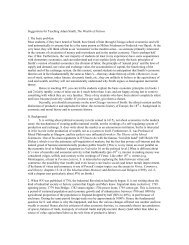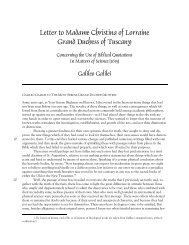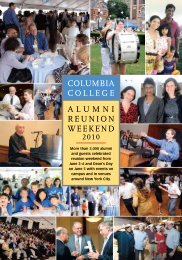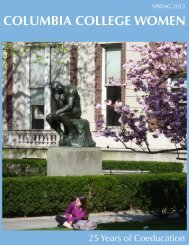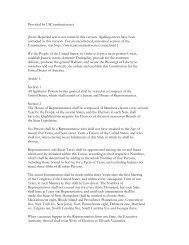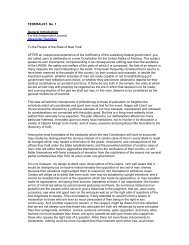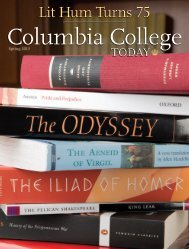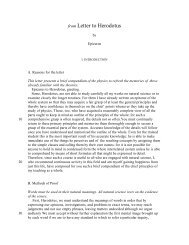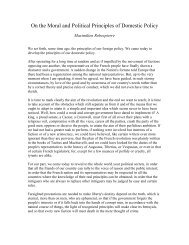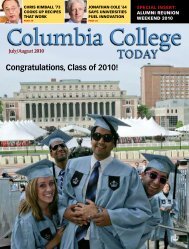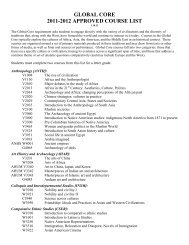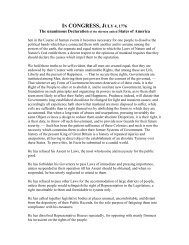Download this issue as a PDF - Columbia College - Columbia ...
Download this issue as a PDF - Columbia College - Columbia ...
Download this issue as a PDF - Columbia College - Columbia ...
You also want an ePaper? Increase the reach of your titles
YUMPU automatically turns print PDFs into web optimized ePapers that Google loves.
BOOKSHELF<br />
COLUMBIA COLLEGE TODAY<br />
COLUMBIA COLLEGE TODAY<br />
Is Our Tradition of Tinkering at Risk<br />
B y Justin DeFreita s<br />
Obituaries<br />
Alec Foege ’88 says tinkering — the<br />
impulse to experiment with existing<br />
objects and technologies to make<br />
“something genuinely new out of the<br />
things that already surround us” — is a crucial<br />
factor in America’s centuries-long success story.<br />
In his new book, The Tinkerers: The Amateurs,<br />
DIYers, and Inventors Who Make America Great<br />
(B<strong>as</strong>ic Books, $26.99), Foege makes his c<strong>as</strong>e by imparting<br />
great tinkering tales p<strong>as</strong>t and present, from<br />
lesser-known endeavors of the Founding Fathers<br />
to the prolific output of Thom<strong>as</strong> Edison’s laboratory<br />
to modern-day innovators, entrepreneurs and<br />
educators.<br />
In some respects, Foege says, tinkering is not <strong>as</strong><br />
e<strong>as</strong>y <strong>as</strong> it used to be. Electronics manufacturers and<br />
their overzealous legal departments are incre<strong>as</strong>ingly<br />
determined to discourage us from cracking open those<br />
sleek c<strong>as</strong>es of molded pl<strong>as</strong>tic and brushed aluminum<br />
— corporate America recently succeeded in making<br />
it a criminal act to hack your phone in order to switch<br />
carriers. But despite efforts to keep our curiosity at<br />
bay, Foege believes we’re in a golden age of tinkering.<br />
“Thanks to innovations such <strong>as</strong> the 3D printer and<br />
the $35 R<strong>as</strong>pberry Pi computer, high-tech tinkering<br />
is incre<strong>as</strong>ingly within the reach of everyone,” Foege<br />
says. “In addition, crowd funding sites such <strong>as</strong> Kickstarter<br />
and Quirky make it e<strong>as</strong>ier than ever to fund a<br />
new idea, and incubators such <strong>as</strong> Tech All Stars and<br />
Y Combinator provide much-needed mentorship<br />
and networking resources to young entrepreneurs.”<br />
Yet he also argues that the tradition is at risk.<br />
“For many generations in the postindustrial age, puttering<br />
around with the mechanical devices that surrounded us w<strong>as</strong><br />
practically a rite of p<strong>as</strong>sage and, for many, a way of life,” Foege<br />
writes. “After an era of economic excess that transformed our<br />
nation from one of doers to consumers, the United States risks<br />
losing its hallowed tinkerer tradition <strong>as</strong> well <strong>as</strong> the engine of<br />
innovation that fueled an unprecedented era of growth.”<br />
Foege himself h<strong>as</strong> long been a tinkerer of sorts, and he recalls<br />
cycling through an array of hobbies and scientific pursuits<br />
while growing up in Rye, N.Y. In fact, he says, he well may have<br />
tested every chemistry set on the market, and even survived a<br />
few experiments with Presto’s infamous hot dog cooker — that<br />
almost medieval device that impaled a sausage on a bare rod<br />
connected directly to an electrical outlet. As a teenager his<br />
interests turned to rock and jazz. “But I w<strong>as</strong> drawn <strong>as</strong> much to<br />
the gear <strong>as</strong> to the music,” he says, “tweaking amps and effects<br />
pedals to alter the sound of my guitar.”<br />
Foege attended <strong>Columbia</strong> because he felt it w<strong>as</strong> the most<br />
countercultural of the Ivy League schools, having nurtured the<br />
budding talents of writers such <strong>as</strong> Allen Ginsberg ’48 and Jack<br />
Kerouac ’44. He became a writer for SPIN, Rolling Stone and People,<br />
and later w<strong>as</strong> one of the founding editors of In Touch Weekly.<br />
International Dispute Settlement<br />
by Riddhi D<strong>as</strong>gupta ’07. D<strong>as</strong>gupta<br />
analyzes international disputes<br />
over land rights and proposes solutions<br />
to the <strong>issue</strong>s that arise from<br />
PHOTO: ABIGAIL POPE<br />
expropriation (Cambridge Scholars<br />
Publishing, $82.99).<br />
The Price of Inequality: How Today’s<br />
Divided Society Endangers<br />
Along the way he wrote books about Sonic Youth,<br />
Clear Channel and Pat Robertson. In 2005 Foege<br />
founded his own business, Brookside Research, an investment<br />
research company. Foege credits his range<br />
of interests in part to the realization, during his time<br />
at <strong>Columbia</strong>, that the divide between the sciences<br />
and the arts and humanities is not only artificial but<br />
also constraining. And conquering that divide, he<br />
says, is a crucial element in tinkering.<br />
“Tinkerers need to be dilettantes,” he says, “and<br />
I mean that in the best sense. You have to let a bit<br />
of air into your thinking.”<br />
The idea for the book came from one of Foege’s<br />
editors, but the concept really came into focus<br />
when Foege faced a typical latter-day consumer<br />
electronics quandary: The screen on his Black-<br />
Berry broke, rendering the device unusable. He<br />
took it to a licensed dealer but the sales representative<br />
said they were no longer allowed to fix<br />
them. “That w<strong>as</strong> my favorite part of the job,” he<br />
told Foege. “Now all I get to do is sell phones.” He<br />
informed Foege that all he could do w<strong>as</strong> sell him a<br />
new BlackBerry, at the full retail price.<br />
Foege decided to research cheaper replacements<br />
online. “What I stumbled onto instead w<strong>as</strong> a<br />
short video on YouTube [that] showed a pair of hands<br />
dis<strong>as</strong>sembling a BlackBerry and replacing the screen<br />
in a matter of minutes,” he writes. He ordered a new<br />
screen from an online retailer and fixed the device<br />
himself for less than a quarter of the cost of replacing<br />
it. Foege had tapped into an online network of DIYers<br />
and discovered that tinkering is indeed alive and well.<br />
The most interesting c<strong>as</strong>e studies Foege presents are of modernday<br />
tinkerers who are attempting to instill a bit of that old-time<br />
spirit in younger generations. One is Gever Tulley, who started<br />
Tinkering School, an adventurous and industrious six-day overnight<br />
camp in San Francisco in which kids work on a series of ever-larger<br />
projects. The first camp, in 2005, saw the kids progress from building<br />
chairs to building bridges and towers, ultimately uniting these<br />
concepts for their final project: a 100-ft.-long roller co<strong>as</strong>ter.<br />
“The detail with which they remember riding the roller co<strong>as</strong>ter<br />
or flying the hang glider that they built,” Tulley says, “the minutiae<br />
they remember and the principles that are burned into their brains<br />
from those experiences — those are l<strong>as</strong>ting, durable memories.”<br />
Like Tulley, Foege believes that the importance of tinkering<br />
h<strong>as</strong> not been generally recognized in recent years, and his book<br />
represents an effort to give the tradition its due. He’s optimistic.<br />
“I believe Americans are beginning to unlock a new level<br />
of consciousness about tinkering,” Foege says. “Having lived<br />
through the era of mammoth corporate conglomerates, we <strong>as</strong> a<br />
country are returning to our tinkering roots and fully appreciating<br />
the power of our historic pioneering spirit.”<br />
Justin DeFreit<strong>as</strong> is a Bay Area writer, editor and artist.<br />
Our Future by Joseph E. Stiglitz,<br />
University Professor. Stiglitz<br />
<strong>as</strong>sesses the implications of an<br />
economically divided society on<br />
democracy, policy and globalization<br />
and proposes a plan for a<br />
more just and prosperous future<br />
(W.W. Norton & Co., $16.95).<br />
Karl Daum ’15<br />
1926<br />
Malcolm R. Warnock ’26<br />
Malcolm R. Warnock, retired<br />
attorney, Maplewood, N.J., on<br />
October 9, 2012. Warnock w<strong>as</strong> born<br />
in Brooklyn, N.Y., and grew up in<br />
Cranford, N.J. He entered Princeton<br />
but transferred to the <strong>College</strong>.<br />
He earned a degree from the Law<br />
School in 1929. During WWII,<br />
Warnock worked for the predecessor<br />
of the Air Force and then on<br />
the Manhattan Project. Until he<br />
retired in 1973, he worked for the<br />
Lehigh Valley Railroad. Warnock<br />
w<strong>as</strong> an avid tennis player into<br />
his 90s. He narrated his church’s<br />
Christm<strong>as</strong> pageant for 40 years and<br />
often had the lead in amateur plays<br />
and musicals. He w<strong>as</strong> a trained<br />
singer, a painter and an antique<br />
clock collector, and he read widely.<br />
Obituary Submission<br />
Guidelines<br />
<strong>Columbia</strong> <strong>College</strong> Today<br />
welcomes obituaries for<br />
<strong>College</strong> alumni. Deaths are<br />
noted in the next available<br />
<strong>issue</strong> in the “Other Deaths<br />
Reported” box. Complete<br />
obituaries will be published in<br />
an upcoming <strong>issue</strong>, pending<br />
receipt of information. Due<br />
to the volume of obituaries<br />
that CCT receives, it may<br />
take several <strong>issue</strong>s for the<br />
complete obituary to appear.<br />
Word limit is 200; text may be<br />
edited for length, clarity and<br />
style at the editors’ discretion.<br />
Click “Contact Us” at college.<br />
columbia.edu/cct, or mail<br />
materials to Obituaries Editor,<br />
<strong>Columbia</strong> <strong>College</strong> Today,<br />
<strong>Columbia</strong> Alumni Center,<br />
622 W. 113th St., MC 4530,<br />
6th Fl., New York, NY 10025.<br />
Warnock and his wife, Dorothy,<br />
lived in Short Hills, N.J., for more<br />
than 50 years. She predece<strong>as</strong>ed<br />
him. Warnock is survived by his<br />
daughter and son-in-law, Margaret<br />
and Eugene Carlough; daughter,<br />
Eleanor; and one grandson. Memorial<br />
contributions may be made<br />
to the <strong>College</strong> (college.columbia.<br />
edu/giveonline), the Law School<br />
(giving.columbia.edu/giveonline)<br />
or Winchester Gardens Association<br />
Scholarship Fund, 333 Elmwood<br />
Ave., Maplewood, NJ 07040.<br />
1943<br />
Harold C. Vaughan, retired history<br />
teacher, Fort Lee, N.J., on September<br />
22, 2012. Vaughan w<strong>as</strong> born<br />
in New York City on October 26,<br />
1923. He did not attend his <strong>College</strong><br />
commencement, <strong>as</strong> he w<strong>as</strong> already<br />
off to b<strong>as</strong>ic training in Biloxi, Miss.,<br />
followed by pilot training with the<br />
Army Air Corps at Elon University.<br />
After the service, Vaughan returned<br />
to Teachers <strong>College</strong> for an M.A.,<br />
graduating in 1945. He began a 38-<br />
year career <strong>as</strong> a high school history<br />
teacher in New York at Collegiate<br />
School in 1947. He taught at Brooklyn<br />
Friends School from 1949–59<br />
and at Ridgewood [N.J.] H.S. from<br />
1959–85, where he introduced a<br />
stock market course. Vaughan w<strong>as</strong><br />
recognized in 2000 with a special<br />
tribute at Brooklyn Friends. He w<strong>as</strong><br />
a devotee of theatre and the arts, author<br />
of seven history books, a world<br />
traveler and an ardent supporter<br />
of civil rights. Vaughan is survived<br />
by his sister, Dorothy V. Brophy;<br />
nephew, Thom<strong>as</strong> E. Brophy; nieces,<br />
Diane V. Brophy and Meta A. Brophy;<br />
two great-nephews; and two<br />
great-nieces.<br />
1946<br />
Charles J. Fabso, retired sales mana -<br />
ger, Durham, N.C., on January 17,<br />
2012. Fabso w<strong>as</strong> born on June 19,<br />
1925, in New York City. He graduated<br />
from Stuyvesant, where he<br />
w<strong>as</strong> president of the senior cl<strong>as</strong>s<br />
and a member the National Honor<br />
Society (known <strong>as</strong> Arista in NYC<br />
public schools). At the <strong>College</strong>,<br />
he w<strong>as</strong> president of Beta Theta Pi.<br />
After earning an M.S. from the Business<br />
School in 1947, Fabso joined<br />
General Electric, where he w<strong>as</strong><br />
manager – sales, Audio Products<br />
Department, and manager – sales,<br />
Home Laundry Department. He<br />
later w<strong>as</strong> director of marketing,<br />
Consumer Electronics Division,<br />
for Philco-Ford. He retired from<br />
GE <strong>as</strong> general manager, Sales and<br />
Distribution Department, Housewares<br />
and Audio Business Division.<br />
Fabso w<strong>as</strong> a member of the<br />
Congregational Church of E<strong>as</strong>ton,<br />
where he w<strong>as</strong> chair of the Board<br />
of Deacons, the Board of Finance<br />
and the Board of Stewardship and<br />
Missions. He is survived by his wife<br />
of 64 years, Joan Winsko Fabso;<br />
children, Joan Fabso C<strong>as</strong>sell and<br />
her husband Ronnie, and Charles;<br />
and three grandchildren. Memorial<br />
contributions may be made to The<br />
Congregational Church of E<strong>as</strong>ton,<br />
PO Box 37, E<strong>as</strong>ton, CT 06612; note<br />
in the check’s memo line “Book of<br />
Remembrance — Charles Fabso.”<br />
1950<br />
Alfonso A. Lordi, sales manager,<br />
Denver, on January 22, 2012. Lordi<br />
w<strong>as</strong> born on January 6, 1925, in<br />
Mount Vernon, N.Y., and w<strong>as</strong> a<br />
50-year resident of Dover, M<strong>as</strong>s.<br />
He w<strong>as</strong> a decorated WWII tech sergeant<br />
serving directly under Gen.<br />
Dwight D. Eisenhower in the 9th<br />
Army Headquarters Company. He<br />
fought at Normandy, in the Battle<br />
of the Bulge and into Germany.<br />
Lordi w<strong>as</strong> then sent to Okinawa<br />
Island to prepare for the inv<strong>as</strong>ion of<br />
Japan. He w<strong>as</strong> awarded six battle<br />
stars and the Meritorious Service<br />
Award for Outstanding Combat<br />
Performance. After the war Lordi<br />
attended <strong>Columbia</strong>, reuniting him<br />
with Eisenhower, then University<br />
president, who often called on him<br />
to entertain foreign dignitaries.<br />
After graduating with a degree<br />
in business, Lordi embarked on a<br />
40-year sales career for Mennen,<br />
Playtex and Exquisite Form. A<br />
mechanical whiz, he w<strong>as</strong> quick to<br />
fix anything with a motor. In Dover,<br />
he w<strong>as</strong> a member of the local VFW<br />
and a longtime member of Saint<br />
Dunstan’s Episcopal Church. Lordi<br />
w<strong>as</strong> predece<strong>as</strong>ed by his wife of 40<br />
years, Elisabeth Perry Lordi, and is<br />
survived by a son, Alan; daughterin-law,<br />
Pamela; three grandchildren;<br />
two of his three brothers, Frances<br />
“Dick” ’50 and Gerardo ’48; and<br />
their wives and children.<br />
Daniel L. O’Keefe, retired magazine<br />
editor, Chappaqua, N.Y., on August<br />
29, 2012. O’Keefe w<strong>as</strong> born on<br />
February 25, 1928, in Jersey City. He<br />
earned a Ph.D. at The New School<br />
for Social Research and studied at<br />
St. Catherine’s <strong>College</strong> Oxford <strong>as</strong><br />
a Rotary Fellow. His journalism<br />
career started in high school with<br />
speeches around the country for<br />
Junior Achievement. O’Keefe had<br />
a New York radio show, “Youth<br />
Demands the Answer,” but w<strong>as</strong><br />
fired when an on-air fistfight broke<br />
out between guests. A Reader’s Digest<br />
editor, he worked with writers such<br />
<strong>as</strong> Ray Bradbury, Ishmael Reed and<br />
Czeslaw Milosz. His book, Stolen<br />
Lightning: The Social Theory of Magic<br />
(1982), w<strong>as</strong> a National Book Critics<br />
Circle Award nominee. In a New York<br />
Times paid death notice, John Leonard<br />
said, “Not since Marx, Darwin<br />
and Freud h<strong>as</strong> there been anyone<br />
so opinionated” and “Mr. O’Keefe<br />
is a better writer than Darwin.”<br />
O’Keefe’s invented family holiday,<br />
“Festivus,” appeared in a Seinfeld<br />
episode, written by his son Daniel.<br />
Each weekend in a Chappaqua bar,<br />
he spoke multiple languages with<br />
his wife and anyone else who would<br />
listen; he spoke 40 languages in all,<br />
with varying accuracy. O’Keefe is<br />
survived by his wife, Deborah; sons<br />
Daniel, Laurence and Markham; and<br />
one grandson.<br />
1952<br />
Mark Flanigan, retired naval officer,<br />
W<strong>as</strong>hington, D.C., on May 26,<br />
2012. Flanigan w<strong>as</strong> born on October<br />
5, 1930, in Manhattan. He w<strong>as</strong><br />
commissioned in 1955 and began<br />
service in the Office of Naval Intelligence.<br />
In 1965, after completing his<br />
first tour of active duty, Flanigan returned<br />
to Morningside and served<br />
for four years <strong>as</strong> <strong>as</strong>sistant dean of<br />
the <strong>College</strong>, with responsibilities<br />
including the direction of <strong>Columbia</strong>’s<br />
Upward Bound compensatory<br />
education program. Coaching<br />
<strong>Columbia</strong>’s 1966–67 <strong>College</strong> Bowl<br />
team, Flanigan told Spectator: “I am<br />
the only coach on campus with an<br />
undefeated, untied and unscoredon<br />
team.” Resuming active duty,<br />
he co-authored recommendations<br />
to the chief of naval personnel for<br />
countering the 1969 NROTC crisis<br />
on the nation’s campuses, which<br />
Flanigan had experienced <strong>as</strong> <strong>as</strong>sistant<br />
dean. He earned an M.A.<br />
in modern European comparative<br />
literature at Harvard (1960) and<br />
taught at <strong>Columbia</strong>, Hunter and the<br />
Defense Intelligence School. Flanigan<br />
retired in 1990 with the rank of<br />
captain and had been awarded the<br />
Navy Commendation Medal. He<br />
is survived by his wife, the former<br />
Doris Rohte ’53 Barnard, and their<br />
daughters, Page and Meg.<br />
1954<br />
Peter D. Ehrenhaft, attorney,<br />
W<strong>as</strong>hington, D.C., on July 25, 2012.<br />
Ehrenhaft w<strong>as</strong> born in Vienna, Austria,<br />
and came with his family to<br />
the United States in 1938. He grew<br />
up in Queens. Ehrenhaft served in<br />
SUMMER 2013<br />
60<br />
SUMMER 2013<br />
61



